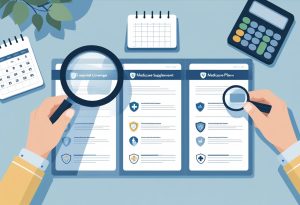When you enroll in Medicare, you might be wondering if you need drug coverage as part of your health insurance.
While enrollment in Medicare Part D isn’t mandatory, you will have to pay a penalty if you don’t obtain creditable prescription drug coverage during the Initial Enrollment Period and you lack other creditable coverage for a period of more than 63 consecutive days. Creditable coverage can be obtained through a current or former employer, Tricare, the Department of Veterans Affairs, and some retiree plans.
This article outlines the penalties you’ll face without Part D coverage.
Do You Need a Prescription Drug Plan?
As a reminder, you are eligible to enroll in the Medicare government program during a period that spans three months prior to your birthday month, your actual birthday month, and three months later for a total period of seven months.
You can also add Medicare prescription drug coverage during the Medicare open enrollment period during the first quarter of each calendar year.
The question, however, is if you need prescription drug coverage or you can simply pay out of pocket for your prescriptions as needed.
There are four things to consider:
- Even if you don’t have an immediate need for a prescription drug plan, your health could change in the future, making paying for prescriptions costly.
- There are limited times of the year when you can join a Medicare Part D plan (or equivalent) for prescription drug coverage.
- You will accrue penalties for each month that you don’t have prescription coverage, and this amount will be added to your monthly premium. Depending on how long you go without prescription coverage, the late enrollment penalty could add a substantial amount to your monthly premium.
- The cost of a Medicare drug plan is nominal compared to the cost of paying for prescriptions, so it’s smart to get creditable drug coverage.
Changes You Can Make to Your Medicare Plan
If you missed signing up for Medicare Part D during the initial enrollment period, you can add Medicare drug coverage to your health insurance later, typically during the annual election period that starts in October.
There are other eligible periods where you can make adjustments to your coverage, including the following:
- If you already have a Medicare Advantage plan, you can switch plans. As a reminder, Medicare Advantage includes the benefits of Original Medicare (including Medicare Part A and Medicare Part B). Further, most Medicare Advantage plans include additional health benefits along with a Part D plan.
- You can also get rid of a Medicare Advantage plan and revert back to Original Medicare. From here, you can add drug coverage.
- You can add a Medicare Part D plan during the open enrollment period from January 1st through March 31st.
Is There a Penalty for Not Having Medicare Part D?
The short answer is yes. If you cannot demonstrate that you have creditably prescription drug coverage for a period of 63 consecutive days, then you will be subject to a monthly penalty when you do finally enroll in Medicare drug coverage.
The longer you wait to get creditable coverage through a Medicare drug plan, the more you will have to pay in monthly premiums. When you add the ever-rising cost of prescription drugs and compare it to the average cost of a Part D premium, then it makes financial sense to ensure you enroll in a drug plan. This coverage can protect your health and your pocketbook.
Calculating the Medicare Part D Late Enrollment Penalty
If you are in a situation where you have to pay a late enrollment penalty because your Medicare plan doesn’t include prescription drug coverage and you don’t have this coverage through an employer or other source, you might be wondering exactly how much you’ll have to pay in additional premiums.
Keep in mind that the late enrollment penalty is cumulative, and it can become significant if you incur several uncovered months of Part D coverage.
Further, the late enrollment period is permanent, so you will continue to pay the penalty forever. This is true even if you later change your Medicare plan coverage during a special enrollment period or some other time.
Medicare calculates the penalty based on the “national base beneficiary premium.” As of 2023, the national average premium is $32.74, so the national base beneficiary premium is 1% of this amount multiplied by the number of months you have incurred without creditable prescription drug coverage. The figure is then rounded to the nearest $0.10 to come up with the Part D penalty.
Here’s an example of how this late enrollment penalty would be added to your monthly Part D premium:
John Doe decided to enroll in Original Medicare (which includes Part A and Part B), but he elected not to get a prescription drug plan because he was in peak physical health and did not take any prescriptions. However, he later learned that there are late enrollment penalties for not having creditable prescription drug coverage, so he decided to add a Part D prescription drug plan to his Medicare program.
However, John Doe was without a Part D drug plan for 20 months. John Doe’s additional premium penalty is calculated as follows:
- .20 (The number of months without coverage at 1% each month) x $32.74 (the current year base beneficiary premium = $6.55
- Rounding to the nearest $0.10, John Doe would pay an additional $6.60 each month for Part D when he finally enrolls.
Challenging the Late Enrollment Penalty
If you disagree with how Medicare calculates your late enrollment penalty, you can ask for a reconsideration by filling out a form and returning it to the proper department. This action must be taken within 60 days of being informed that you have to pay the penalty.
Conclusion
It’s recommended to get creditable prescription drug coverage as soon as possible, whether it is during the initial enrollment period or Medicare Open Enrollment, to avoid paying the penalty on your monthly premiums. For the most up-to-date and accurate information, contact a Medicare advisor.
5 Most common Questions About Medicare Part D
If I don’t take any drugs or my drugs are super cheap without insurance why do I have to enroll in a Part D drug plan?
A. Medicare Part D is completley optional and you donot have to enroll in a plan. However Medicare does want everyone to participate in the Part D program even if you feel like its a waste of money. The center of Medicare & Medicaid services has designed the Part D program with very specific enrollment time frames and if you do not enroll when first eligible you will be accessed a penalty of 1% of the average cost of a part D plan for each month you are not enrolled. It is also importan to know you can’t just enroll in a drug plan whenever you want there must be a valid enrollment period.
Will all my prescriptions be covered?
Yes, most people will have to pay for Medicare part B the base premium for 2022 is $170.10. Some people may pay more based on their income. Medicare has established a sliding scale. Click here to learn more.
Why do I need to get extra coverage?
Medicare Part D carriers usually use a committee to create each plans formulary. While they will cover at least two drugs in every therputic prescription classification it does not mean they will cover all drugs. Mmost states offer close to 20 options for drug plans and you can usually find a plan that covers your specific needs. If you do not there are appeals process you can follow to try and get your drug added on for you.
I only take generic drugs will I still have to pay a deductible?
A. Some plans have deductibles and others do not. Typically plans with lower premiums have higher deductibles and plans with higher premium have low or NO deductible. Most of the time generic drugs will fall under no deductible needing to be met, but not always. So make sure you double check before you assume your generic will not have a deductible phase.
I am diabetic and take insulin will all my diabetic supplies be covered?
Yes all of your diabetic supplies will be covered, but they are covered under part B of medicare under the category of durable medical equipment.
When do I enroll in Medicare?
A. For most people Medicare enrollment should happen during your initial enrollment period, which begins three months before you turn 65 and runs three months after the month you turn 65. There are several different special election periods as well depending on your circumstances. Click here to learn more
Can I change my Part D plan?
A. Yes you can change your part D plan, typically its allowed to be done Octobet 15th- December 7th during the Medicare Annual election period. There may be a special election period depending on your situation that allows you to change your plan other times of the year.






